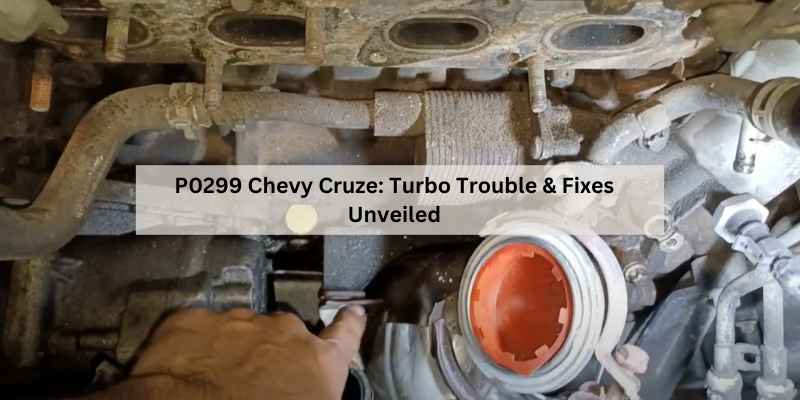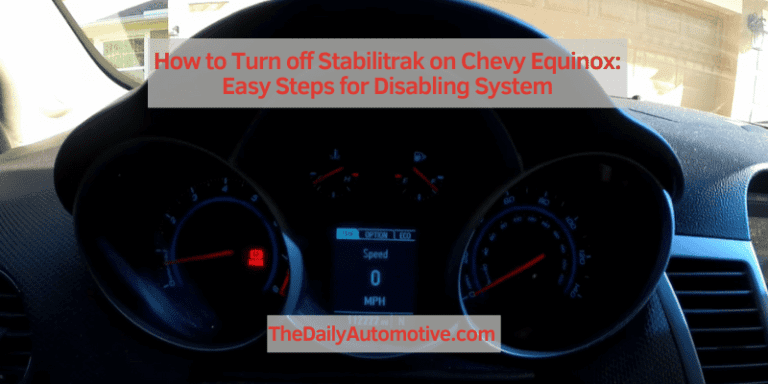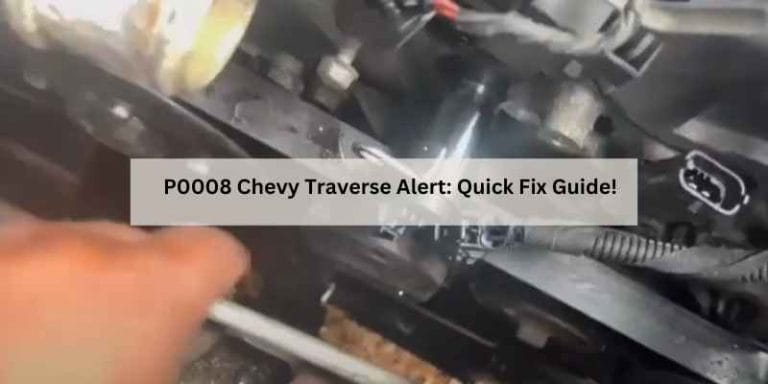P0299 Chevy Cruze: Turbo Trouble & Fixes Unveiled
The P0299 code in a Chevy Cruze indicates a “turbo underboost” issue. This typically means the turbocharger isn’t generating adequate boost pressure.
The P0299 code is a common issue for Chevy Cruze owners, signaling problems within the turbocharger system. Turbo underboost can lead to a noticeable loss of power and performance. Factors contributing to this code include leaks in the intake tract, a faulty turbocharger, or issues with the boost control system.
Identifying the exact cause requires a thorough inspection of the vehicle’s components. Ignoring this code can lead to severe mechanical failures and reduced efficiency. Addressing the P0299 code promptly ensures your Cruze remains reliable and maintains optimal performance levels. Regular maintenance can help prevent such issues from arising.
P0299 Chevy Cruze: Decoding The Trouble Code
The P0299 code in a Chevy Cruze signals a turbo or supercharger low output issue. This can lead to serious problems. Drivers often notice a loss of power and poor performance. The engine may feel sluggish and unresponsive. Acceleration could be affected, making it hard to merge onto highways.
Common symptoms include a check engine light and reduced fuel efficiency. Some may experience unusual noises from the turbocharger. Vibration during acceleration may also occur. Stalling might happen in extreme cases. Addressing this issue quickly is vital to avoid further damage.
| Symptoms | Description |
|---|---|
| Loss of Power | Engine feels sluggish and unresponsive. |
| Check Engine Light | Illuminates to indicate a problem. |
| Unusual Noises | Sounds from the turbocharger during operation. |
| Reduced Fuel Efficiency | More fuel used without increased power. |
Common Causes Behind P0299 In Chevy Cruze
P0299 in a Chevy Cruze often points to issues with the turbocharger. One common cause is turbocharger failures. These may involve sticking or binding components that prevent proper operation. When the turbocharger cannot boost effectively, performance declines significantly.
Another frequent issue is intake tract leaks. These leaks can occur due to loose connections or damage in the intake system. A compromised intake tract can lead to insufficient air entering the engine. This condition can also trigger the P0299 code.
Regular maintenance and inspection can help identify these problems early. Addressing turbocharger and intake tract issues ensures the vehicle runs smoothly and efficiently.
Diagnostic Steps For P0299
Begin with initial checks to understand the P0299 code. This code often means your turbo is not working properly. Look for loose connections or damaged hoses in the intake system. These issues are common and can cause air leaks.
Next, conduct pressure testing. This step helps identify any intake issues. Use a pressure gauge to see if the system holds pressure. A drop in pressure indicates a leak. Fixing these problems can greatly improve your turbo’s performance.
Always monitor your vehicle’s performance after repairs. If issues persist, consider a professional diagnosis for further problems.
Professional Insights From Forums And Experts
The P0299 code in a Chevy Cruze signals a problem with the turbocharger. This usually means the turbo is not generating enough boost. Many users report that a common cause is leaks in the intake tract. These leaks can occur due to loose connections or damaged components. Checking these connections can be a simple first step.
Experts suggest using a pressure gauge in the intake circuit. This test can help confirm if leaks are the issue. Other potential causes include a failed or damaged turbocharger. Symptoms often include a loss of power and performance.
| Symptoms | Causes | Actions |
|---|---|---|
| Loss of power | Intake leaks | Check connections |
| Poor performance | Damaged turbo | Inspect turbocharger |
| Warning light | Underboost condition | Immediate repair needed |
Step-by-step Repair Guide
Turbocharger Replacement is crucial for performance. Check for signs of failure, such as loss of power. If the turbocharger is damaged, replacement is necessary. Follow these steps:
- Disconnect the battery.
- Remove the intake and exhaust pipes.
- Unbolt the old turbocharger.
- Install the new turbocharger securely.
- Reconnect all components and battery.
Fixing intake tract leaks is also important. Leaks can cause underboost problems. Here are some practical tips:
- Inspect all hoses and connections for damage.
- Tighten loose clamps and fittings.
- Use a smoke test to detect hidden leaks.
- Replace damaged components immediately.
Preventive Measures To Avoid Turbo Trouble
Regular maintenance is key to keeping the turbo healthy. Check the oil level often. Clean or replace the air filter regularly. Inspect the turbocharger for leaks and wear. This ensures the turbo operates efficiently.
Monitoring performance is vital for early detection. Listen for unusual noises from the turbo. Pay attention to any loss of power. Use a diagnostic tool to check for error codes. Catching issues early can save money and time.
Costs Associated With Fixing P0299
Repairing a P0299 Chevy Cruze can involve various costs. Parts and labor are significant factors in budgeting for this repair. Common parts include the turbocharger and intake components. Depending on the damage, these parts can range from $200 to $1,500.
Labor costs may vary by location and mechanic expertise. Expect to pay between $100 to $150 per hour. Total repair costs can range from $300 to $2,000, depending on the issue’s complexity.
| Repair Type | DIY Cost | Professional Cost |
|---|---|---|
| Turbocharger Replacement | $200 – $800 | $800 – $1,500 |
| Labor (1-3 hours) | $0 – $450 | $100 – $450 |
Choosing between DIY and professional repair impacts overall costs significantly. DIY repairs can save money but require time and skills. Professional repairs ensure quality but come at a higher price.
Conclusion: Navigating Turbo Troubles Successfully
Understanding the P0299 code is essential for Chevy Cruze owners. This code indicates turbo underboost, meaning the turbocharger isn’t working correctly. Common causes include leaks in the intake tract. Check for loose connections or damaged hoses. A simple pressure test can confirm these issues.
Maintaining your Chevy Cruze prevents further problems. Regularly inspect the turbocharger and its components. Ensuring all connections are tight can save you time and money. If problems persist, consider seeking help from a professional mechanic. They can provide a thorough diagnosis and repair.
By staying proactive, you can enjoy a smooth driving experience. Remember, timely maintenance is key to keeping your Chevy Cruze running well.
Frequently Asked Questions
How Do You Fix The Code P0299?
To fix code P0299, check for intake leaks or loose connections. Inspect the turbocharger for damage or malfunction. Replace any faulty components, and clear the code. Test drive to ensure the issue is resolved. Regular maintenance helps prevent this problem in the future.
What Causes A P0299 Code On A Chevy Cruze?
A P0299 code on a Chevy Cruze indicates turbo underboost. Common causes include turbocharger failure, intake leaks, or damaged hoses. These issues prevent the turbo from generating adequate boost pressure, leading to performance problems. Regular maintenance can help prevent this code from appearing.
What Is The Most Common Cause Of P0299?
The most common cause of P0299 is an intake leak. This can result from loose connections or damage in the intake system. Other potential issues include a faulty turbocharger or wastegate. Addressing these problems promptly can restore proper turbo function and vehicle performance.
Can I Still Drive My Car With A P0299 Code?
Driving with a P0299 code is not recommended. This code indicates a turbo underboost condition, which can lead to reduced performance and potential engine damage. It’s best to address the issue promptly to avoid further complications. Seek professional assistance to diagnose and repair the problem.
Conclusion
Addressing the P0299 code in your Chevy Cruze is crucial for maintaining performance. Ignoring it can lead to more severe issues. Regular diagnostics and prompt repairs will keep your vehicle running smoothly. Stay informed about potential turbocharger problems to ensure a safe and efficient driving experience.
Prioritize your car’s health for long-term reliability.







